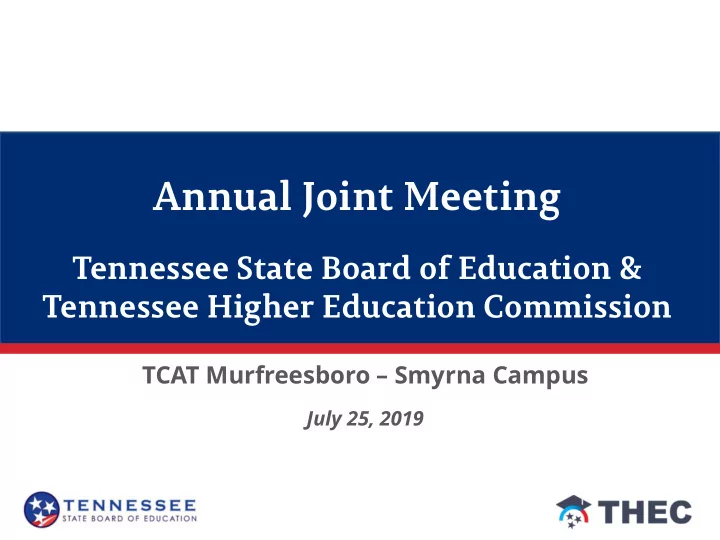

Annual Joint Meeting Tennessee State Board of Education & Tennessee Higher Education Commission TCAT Murfreesboro – Smyrna Campus July 25, 2019
Industry Partnerships • Mr. Dan Caldwell, Senior Manager for Learning Pathways, Nissan North America • Ms. Beth Duffield, Senior Vice President of Education and Workforce Development, Rutherford County Chamber of Commerce • Dr. Carol Puryear, Vice Chancellor for Economic and Community Development, Tennessee Board of Regents • Ms. Victoria Harpool , Assistant Executive Director for Academic Affairs, Moderator
Tennessee Education Continuum Collaboration for Student Success Emily House, THEC Deputy Executive Director Amy Owen, SBE Director of Policy and Research
Shared Vision for Tennessee Mission Goal 3 Relentlessly focused on increasing the number of Tennesseans with a postsecondary credential
College Going Rate for 2017 Grads 72,289 9 th grade cohort 64,407 high school graduates 4.3 39.9 55.9 TCAT 2-year 4-year 41,264 college enrollees
72,8 6 5 Students 2007 Cohort of High School Freshm en 10 ,545 students 22,334 students 40 ,235 students did not graduate high school entered the workforce enrolled in postsecondary $9,0 30 average income 16% chance of earning above minimum wage
Equity in Education State Board of Education - Serve All Students: We will work to ensure all students have the support and pathways they need for success. Tennessee Higher Education Commission - Reimagining and continuing the equity conversation: focus on the outcomes of many student subgroups.
Varying Opportunities and Outcomes • Lake County Student: Academically underprepared (ACT score under 19), African- American female • Metro Nashville Public Schools Student : Economically disadvantaged, Hispanic male • Sullivan County Student: White female student with disability
Lake County Student K-12 Context (2017-18) Lake County Schools TN K-12 Avg. On Track or Mastered 23.3% 39.1% Racial Minorities 17.5% 24% • Economically Disadvantaged 18.1% 23.5% • Chronically Out of School 21.5% 13.3% Average ACT Composite 17.1 20.1 Graduation Rate 96.2% 89.1% Ready Graduate Indicator 30.2% 35.8% Postsecondary Enrollment 43.1% 64.1% Postsecondary Context TCAT Newbern TCAT Avg. Credential Completer 85.1% 81.6% Infield Job Placement 85% 84.8%
Interventions and Best Practices Educator Preparation TN Promise SPARC Advise TN Financial Support
Davidson County Student K-12 Context (2017-18) Metro Nashville TN K-12 Avg On Track or Mastered 27.4% 39.1% Racial Minorities 19.6% 24% • Economically Disadvantaged 16.6% 23.5% • English Learners 17.5% 21.4% • Ready Graduate Indicator 23.6% 35.8% CTE Concentrators 41.5% 40% Postsecondary Enrollment 60.9% 64.1% Postsecondary Context Nashville State CC CC System Avg Retention (Fall 2017 – Fall 2018) 42.9% 55.1% Graduation Fall (2012 cohort) 22.1% 30.5% Hispanic 15.4% 26.8% • Economically Disadvantaged 20.8% 26.8% • TN Job Market Placement 98.3% 98%
Interventions and Best Practices Educator Preparation TN Pathways GEAR UP SAILS Financial Support
Sullivan County Student K-12 Context (2017-18) Sullivan County TN K-12 Avg On Track or Mastered 35.7% 39.1% Racial Minorities 27.7% 24% • Students with Disabilities 12.7% 14.2% • Average ACT Composite 19.8 20.1 CTE Concentrators 56.2% 40% FAFSA Completion 83.3% 83.7% Postsecondary Enrollment 65% 64.1% Postsecondary Context UT Knoxville Public Univ Avg Retention (Fall 2017 – Fall 2018) 91.9% 81.1% Graduation Fall (2012 cohort) 82.2% 60.4% African American 72.5% 45.5% • Hispanic 78.4% 57.5% • Economically Disadvantaged 75.1% 50.7% •
Interventions and Best Practices Educator Preparation EPSOs Community Partnerships Financial Support
Conclusion • Education is a continuum. • Much progress made, still much to do. • Promising practices locally and regionally – how to expand?
Questions
Recommend
More recommend